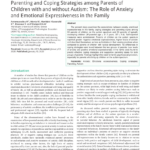Are you a parent navigating the complexities of raising a child with autism? You’re not alone! With 1 in 54 children being diagnosed with Autism Spectrum Disorder (ASD) in the United States, it’s essential to understand how to address the common challenges that come with parenting a child with autism. In this insightful article, we’ll provide you with practical tips and strategies to help you overcome everyday hurdles and foster a nurturing environment for your child’s growth and development. So, let’s dive in and explore the world of autism parenting together, empowering you to create a happy and fulfilling life for your entire family!
Exploring Effective Communication Strategies for Children with Autism

Incorporating effective communication strategies for children with autism is a crucial aspect of parenting. This not only helps in fostering a strong parent-child bond but also aids in their overall development. One of the key aspects of this process is understanding your child’s unique communication style and adapting to it. Utilizing visual aids, social stories, and assistive technology can significantly enhance their ability to express themselves. Encourage non-verbal cues, such as gestures and facial expressions, while maintaining patience and consistency in your approach. Remember, optimizing communication methods for your autistic child can significantly improve their social skills, self-esteem, and emotional well-being.
Navigating Sensory Overload: Tips for Creating a Comfortable Environment

Navigating sensory overload is a crucial aspect of parenting a child with autism, as creating a comfortable environment can significantly improve their daily life. To achieve this, consider implementing a sensory-friendly home design by using calming colors, soft textures, and reducing clutter. Be mindful of potential triggers, such as loud noises and bright lights, and provide your child with tools to cope, like noise-canceling headphones or weighted blankets. Establishing a designated “safe space” for your child to retreat to when overwhelmed can also be helpful. Remember, individual sensory preferences will vary, so it’s essential to communicate with your child and observe their reactions to create a tailored, soothing atmosphere.
Building Social Skills and Friendships: Encouraging Inclusivity for Your Autistic Child

Building social skills and fostering friendships are vital aspects of raising a child with autism. Encouraging inclusivity for your autistic child can be achieved by actively engaging them in social situations and group activities, ensuring they have ample opportunities to interact with their peers. Make use of visual aids, social stories, and role-playing exercises to help your child understand social cues and appropriate responses. Work closely with your child’s school to create an inclusive environment, advocate for their needs, and promote awareness about autism. Additionally, reach out to local support groups and online communities to connect with other parents and children facing similar challenges. By fostering a sense of belonging and nurturing their social abilities, you’ll empower your child to build strong, meaningful relationships.
Managing Meltdowns and Behavioral Challenges: Proactive Approaches for Parents
Effectively managing meltdowns and behavioral challenges is crucial for parents of children with autism. Adopting proactive approaches helps in creating a supportive environment that fosters growth and development. Start by identifying triggers that may cause undue stress or anxiety for your child, such as sensory overload or changes in routine. Implementing visual schedules and social stories can aid in providing structure and predictability for children with autism. Furthermore, teaching self-regulation techniques and offering praise for positive behavior can encourage independence and self-control. Remember, consistency is key when implementing these strategies, as it establishes a sense of security and trust for your child.
Fostering Independence and Self-Confidence in Your Child with Autism: Strategies for Success

Fostering independence and self-confidence in your child with autism is crucial for their overall development and well-being. To achieve this, start by creating a structured environment and routine that cater to their unique needs. Encourage your child to make choices by providing them with simple options, and promote self-help skills by breaking tasks into smaller steps. Praising their efforts and accomplishments will help boost their self-esteem, while engaging in social activities can help enhance their communication skills. Additionally, using visual aids and social stories can help your child better understand new situations and build their confidence in navigating everyday challenges. By implementing these strategies, you’ll be setting your child up for success and supporting their journey towards independence.




